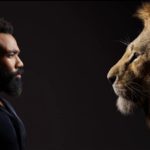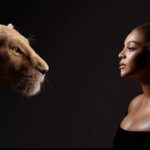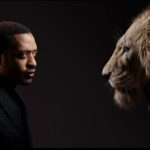It’s not often that I can get behind remakes, reboots, or reimaginations of superbly told stories and films. While there have been a few, rarely do we see such incarnations surpass the excellence of beloved originals. Merely remaking something to remake it or because one thinks lightning may strike twice is not a good enough reason to undertake the task. The question should always be, what can a remake or reimagination add to the original film and the elements that make it so beloved and enduring, how can it enhance existing excellence while staying true to the original work. Disney does an exemplary job of asking that question and then delivers in spades. We’ve seen it with, among others, “Beauty and the Beast”, “Pete’s Dragon”, “Cinderella”, and “The Jungle Book.” And now we see it again with director Jon Favreau and THE LION KING.
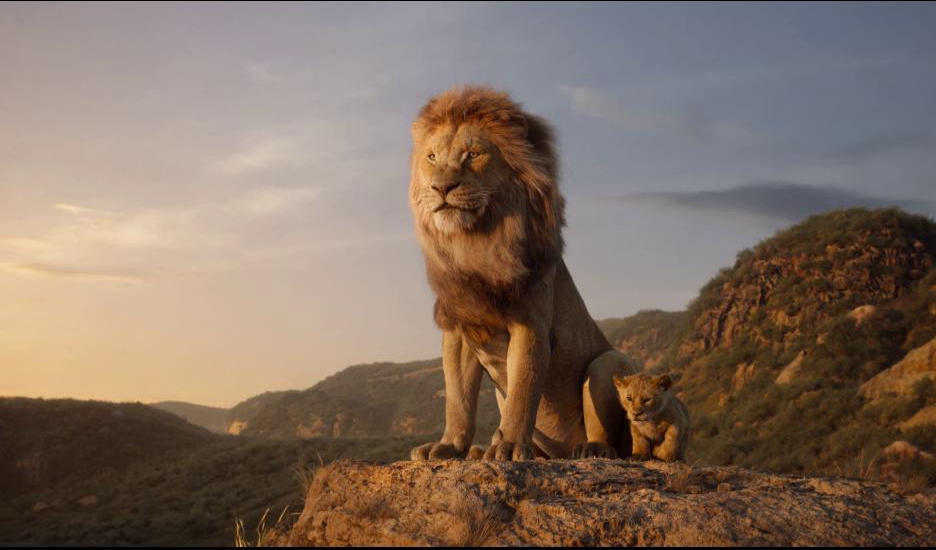
Staying true to the story of the animated original, screenwriter Jeff Nathanson takes us back to the African savanna and the birth of Simba, the future king. We are reintroduced to all of the characters we have come to know and love over the past 25 years – Simba’s father King Mufasa, his mother Sarabi, Mufasa’s somewhat evil brother Scar, the wise one Rafiki, Mufasa’s faithful servant Zazu, Simba’s besties Timon, Pumbaa, and of course, Nala, plus some rather well known hungry hyenas. Every story beat is as we remember it as we watch Simba grow and learn about facing truths about himself and others, and overcoming heartache and loss; and, of course, learn all about Hakuna Matata. The difference this go round is that instead of being animated, each character, and this entire world, is a virtual reality creation with realism and authenticity that side by side one would be hard-pressed to say which is the VR creation and which is the real animal and environment.
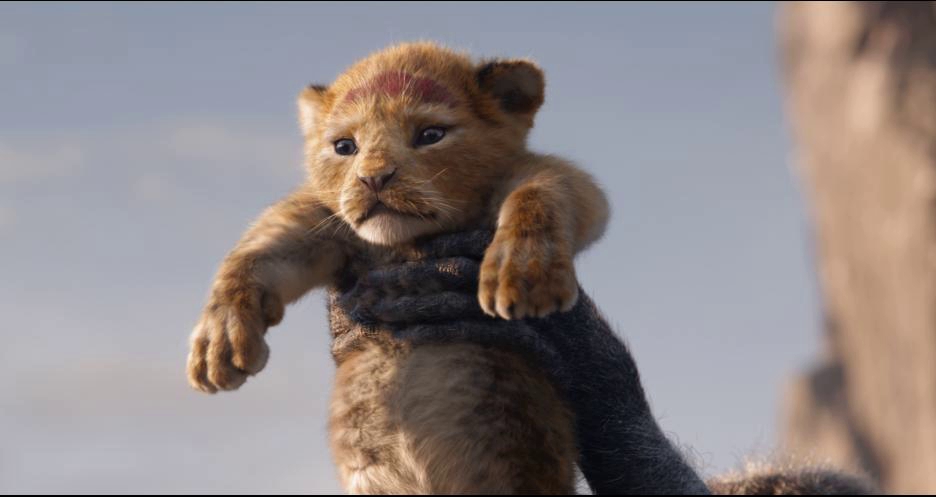
Where Nathanson does expand on the animated film is with some of the individual characters, particularly Nala, Sarabi, and hyena queen Shenzi, giving them a bit more oompf and presence in the film. On the whole, the script is wonderfully adapted, embracing and honoring the original, but then making some of the dialogue not only more topical, but with more laugh-out-loud funny humor, the latter which is carried thru in some fun visually comedic scenes (i.e., Pumbaa farting in the pond as a baby. . .and again as an adult. Kids are gonna love those scenes!) And be on the lookout for some fun Disney “Easter Eggs”!
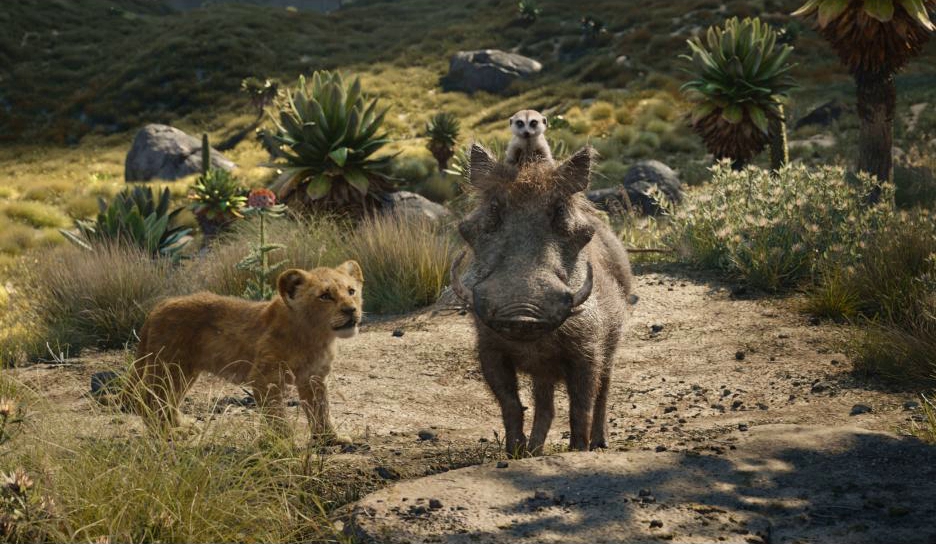
A director ahead of the curve with his understanding of today’s cutting edge technology, Jon Favreau embarked on a technological venture some six years ago with a “live-action” adaptation of Disney’s animated delight, “The Jungle Book.” Thanks to pioneering filmmaking techniques with virtual reality, Favreau delivered a jaw-dropping, mind-blowing film with such realism that one would have thought they were watching a Disneynature or NatGeo live-action animal film. He stayed true to the story, cast the voicing impeccably, and introduced us to only one human character in the mix. Everything else was created.
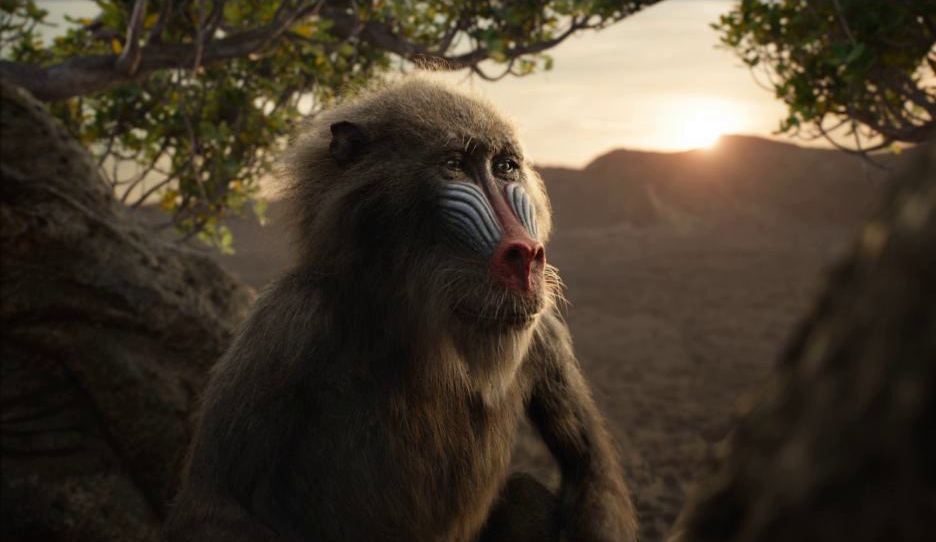
With THE LION KING, Favreau ups the ante yet again with even newer pioneering filmmaking techniques thanks to the HTC Vive Virtual Reality System and the real game-changer, the Unity Game Engine, which places the filmmakers inside the world built for the film. This means that cinematographer Caleb Deschanel actually steps into the world of Pride Rock and is able to light the set for time of day, weather, spectacular African sunsets, and camera operators can block the cameras and cranes to showcase a panoramic vista of the land over which Mufasa reigns, or to capture the intensity of a chase or a lion-on-lion battle or a playful Simba frolicking in a paradise of fun. This new technology allows Favreau, Deschanel and the entire team, including the actors, to shoot the film like a live-action production versus one that is purely animation and CGI. (Look out for some Oscar gold with the technology and visual effects come awards season.) The mastery of Caleb Deschanel’s cinematography shines thru in creating this world and the wonder of it.
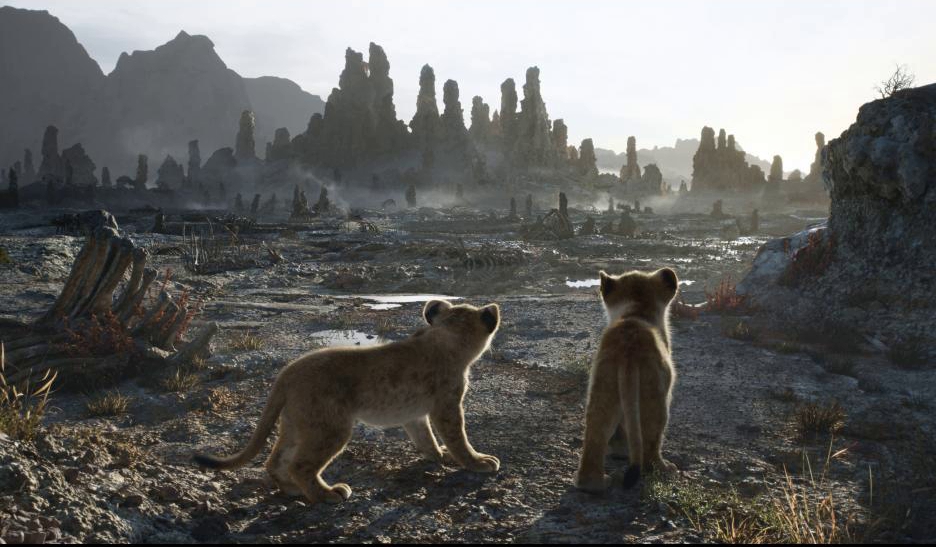
The one downside to the film, however, comes with the characters themselves. We are missing the emotionality of moments within the eyes. In animation, one can draw a smile or a tear or add a glint to an eye. In real life, we can see and feel that twinkle, that spark, or that sadness with the eyes. With this VR system, we don’t see that. (Well, it probably can be done but that would destroy the realism and authenticity and purpose of what the technology is bringing to life.) It thus falls completely to the voice acting and the orchestration of Hans Zimmer’s score to not only bring the emotionality of the film to the forefront but have it resonate and connect within the heart of each moviegoer. While we feel emotion as Mufasa raises up or Simba battles with Scar and see the musculature of the animals, we don’t feel it within the characters. This is a technological aspect that will undoubtedly be improved upon in the near future as tech progresses.
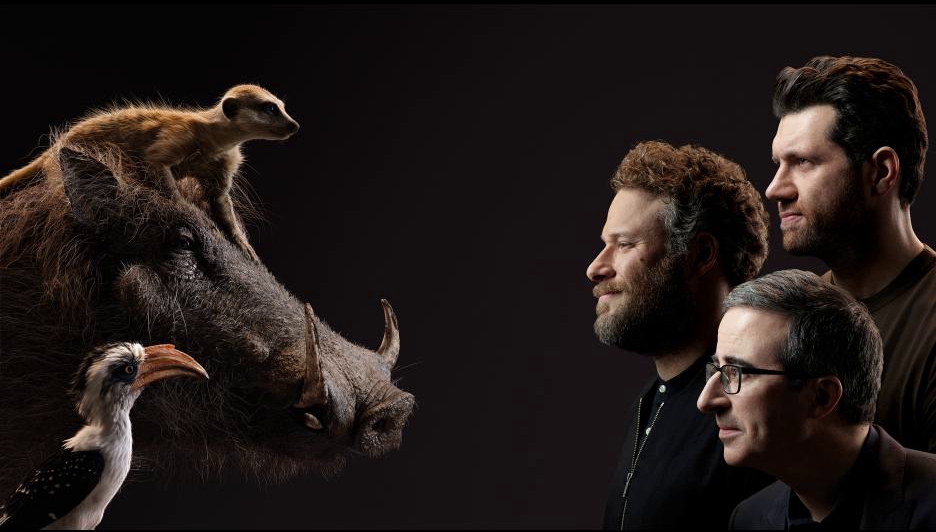
Speaking of actors, the voice casting is flawless and you clearly hear the difference in vocal inflections and energy from the animated film, something which must be credited to the Unity Game Engine technology as rather than just stand in a booth and do voicing, they were able to experience scenes and essentially interact. Favreau also had many of his actors doing voicing together versus individual voice recordings. One listen to Billy Eichner and Seth Rogan as Timon and Pumbaa, respectively, and you can hear the energy and the conversational repartee between them with free-flowing freedom that comes with lifelong friends. And dare it be said that Eichner steals the film as Timon. Further hilarity ensues thanks to Keegan-Michael Key and Eric Andre as hyenas Kamari and Azizi who, like Eichner and Rogan, did their voicing together creating a perfect ebb and flow.
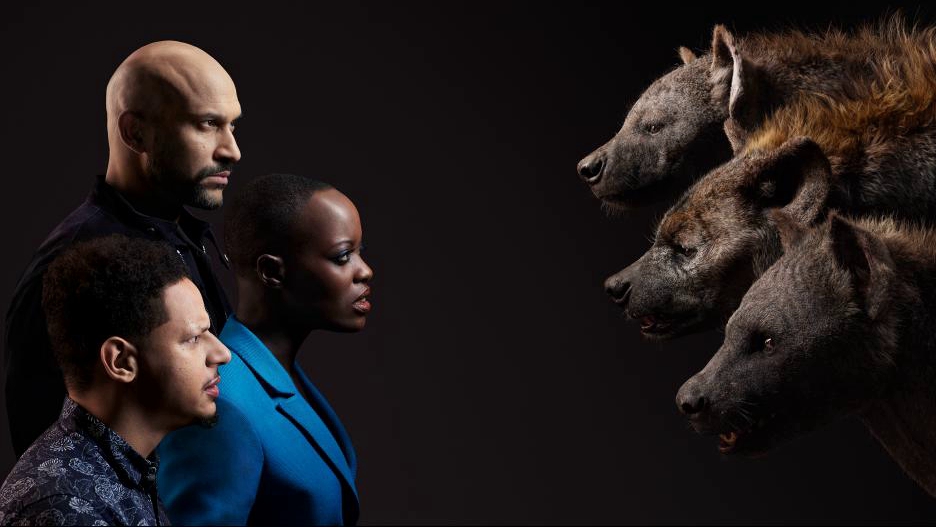
As only he can do, James Earl Jones returns to voice Mufasa with all the majesty and gravitas possible. Alfre Woodard voices Sarabi with a calm, but firm, maternal softness. No stranger to THE LION KING and the character of Nala is Shahadi Wright Joseph who played Nala on Broadway for more than 200 performances. Similarly, Florence Kasumba joins the film as the voice of Shenzi the hyena, a character she voiced in the stage production for well over a year. The legendary Dr. John Kani more than fills the bill as Rafiki. Kani, an acclaimed South African actor, director, and playwright adds an underlying note to the film and the origins of the world as a whole. John Oliver is a joy as the somewhat nervous Nelly and pretentious red-billed hornbill Zazu who serves as Mufasa’s right-hand man, er bird. And Chiwetel Ejiofor is dripping deliciousness as Scar.
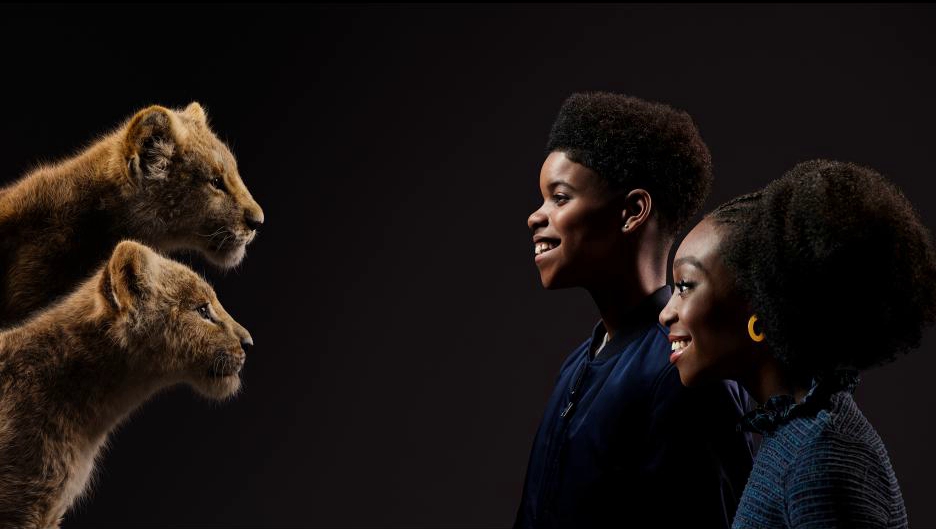
But the big ticket voicing comes from Donald Glover and Beyonce Knowles as adult Simba and adult Nala, respectively. While unimpressed with Knowles’ work, Glover is pure joy. Glover’s work is a perfect meld with that of JD McCrary as young Simba. Glover brings attitude that is fun, particularly when paired up with Eichner and Rogan as Timon and Pumbaa.
Visuals aside (and they are unparalleled), the truly outstanding aspect of THE LION KING is not only Hans Zimmer’s score, but the orchestration and arrangement of it which is then elevated even further with flawless sound mixing. The score is rich and lush with full orchestral gravitas, particularly in the third act and the climactic fire. The orchestration and arrangement is what gives the film a true sense of majesty. Working with Lebo M (whose voice gives rise to the Zulu chant at the beginning of “The Circle of Life” – “Nants ingonyama bagithi. Baba Sithi uhm ingonyama. Siyo Nqoba. Ingonyama. Ingonyama nengw’ enamabala), the two not only open up the thematic elements of the score and put together an orchestra to handle the musical arrangements, but add chorale for one of the most moving scores you will ever hear.
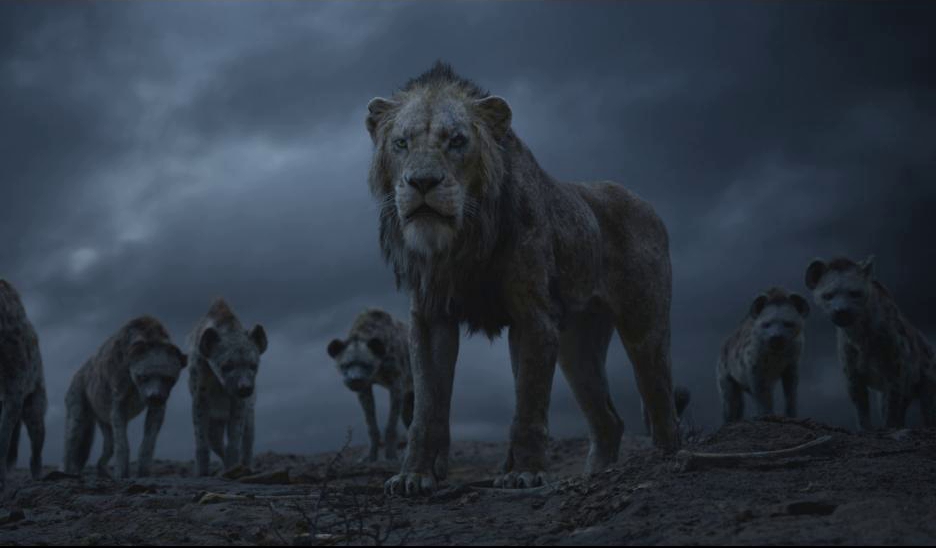
The power of the score set to the silhouetted visuals rivals that of the burning of Atlanta in “Gone With The Wind” as Rhett and Scarlett frantically try to flee. And akin with the epic nature of GWTW and Max Steiner’s score, here Zimmer fills the sonic space with a score reminiscent of Steiner or Herrmann, filled with emotion and depth, both of which really provide the emotionality of the film as a whole. But the orchestration itself is impeccable. Start the Oscar campaign now for Hans Zimmer.
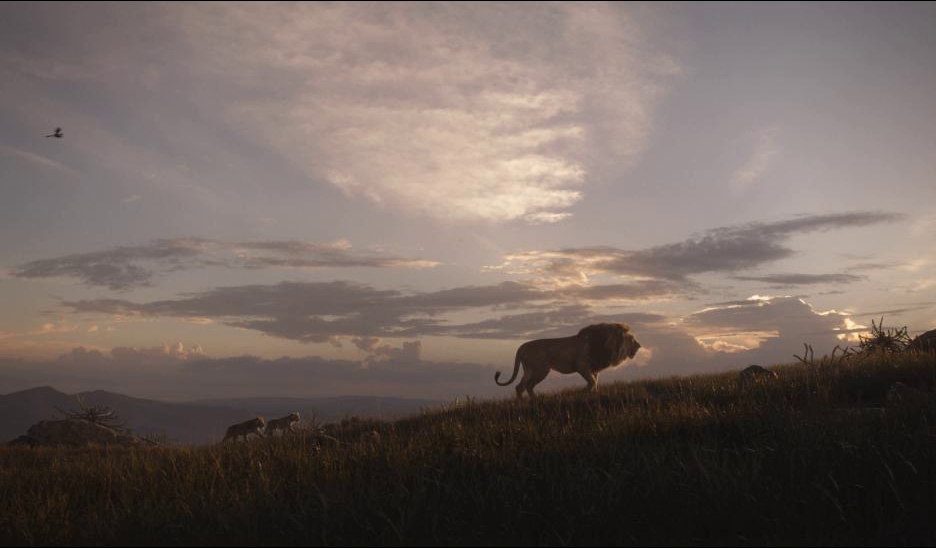
Hand in hand with Zimmer’s score are the individual songs, updated from the animated film and with a couple of new ones added, while some of the new performances are not as indelible or as sing-a-long friendly as the originals, they complete THE LION KING experience.

But then we have to look at sound mix and it is truly breathtaking. The minutiae of every little sound of nature and the creatures big and small who inhabit this wondrous world is astounding. From the click of a dung beetle, the buzz of tiny insect wings, the rustle of Mufasa’s mane, the flutter of butterfly wings, the padding of paws, the gallop of a stampede of hundreds of water buffalo, a single rock falling off a cliff, the beauty of a small waterfall and the soft ripple of water – we hear it all. The mix, done in Dolby Atmos, allowing for those 64 contrasting sonic fields, is so perfectly done melding score and dialogue with the sound effects. . .just beauteous.
Long live the king; THE LION KING! Glorious. Majestic. Masterful.
Directed by Jon Favreau
Written by Jeff Nathanson with story by Brenda Chapman
Voice Cast: James Earl Jones, Donald Glover, Beyonce Knowles, Alfre Woodard, Chiwetel Ejiofor, Seth Rogan, Billy Eichner, Keegan-Michael Key, Eric Andrew, JD McCrary, Shahadi Wright Joseph, Florence Kasumba, John Oliver, John Kani
by debbie elias, 07/09/2019

